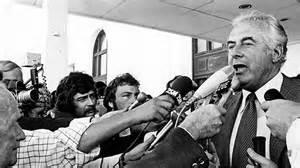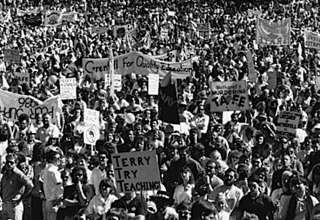by Humphrey McQueen
 This article, originally published in 2000, is the second of three articles about the “Whitlam Era” that the author has given permission to republish.
This article, originally published in 2000, is the second of three articles about the “Whitlam Era” that the author has given permission to republish.
Omnium consensu capax imperii nisi imperasset. Much as Edward Gough Whitlam would have prided himself on being able to translate Tacitus’s remark that everyone had thought Servius Sulpicius Galba (c.3BC-69AD) possessed the makings of an emperor until he ascended the throne, the Whitlam vanity would have been affronted by any suggestion that the same judgement applied to him. Success at parliamentary politics requires an immunity to self-reflection. The Whitlam wit could be self-mocking, never self-deprecating. Hauteur outdistanced grandeur.
Among true believers, the Whitlam reputation was secured by his dismissal on 11 November 1975, to survive even his involvement with a scheme to finance the ALP’s 1975 campaign by borrowing from the Iraqis. Thereafter – apart from East Timor – Whitlam kept to the high ground so successfully that by the mid-1980s his arrival at operas-in-the-park would be greeted by a standing ovation.
The Whitlam conviction that he was “destined to lead’ was not shaken by three failed attempts to be elected to public office before winning a federal seat in 1952. His advancement came through the numbers game. Hence, evaluation of his career must attend to his wheeler-dealing as well as to the afflatus. In 1968, the Whitlam arrogance crossed the auguries of his increasing eminence. By supporting Brian Harradine, now senator, as a Tasmanian delegate to the ALP’s Federal executive, Whitlam provoked a leadership spill during which several of his votaries in caucus switched to Jim Cairns to remind Gough that the Labor party was not his fiefdom. In 1970, he allied himself with erstwhile enemies to dislodge the ALP’s Victorian Central Executive.
At the polling booths, Whitlam’s triumph was to gain seventeen-seats in 1969. Far from demolishing the hapless Billy McMahon in 1972, Whitlam fell just short of a majority of the primary votes. His government was returned in 1974 with a reduced majority and no improvement in its Senate numbers, despite buying off one senator with an ambassadorship. Vanquished in 1975, he mounted another verbally coruscating campaign in 1977, to achieve Labor’s lowest percentage of the primary vote since 1931. Stepping aside as leader, he took another world tour before retiring from the parliament.
When Whitlam had canvassed for the deputy-leadership of the parliamentary Labor Party in early 1960, his caucus critics mocked him as “the young brolga”, or as “white-tie-and-tails”. The characteristics that offended the old guard on the right and left were making Whitlam the hope of younger activists, those offspring of the working class who had embarked on higher education and were seeking a Labor leader to express their professionalism in a tone of voice flattering to their aspirations, matching the Menzies vowels and cadences.
Whitllam did not take the lead against White Australia, where the left-wing Victorian front-bencher Dr Jim Cairns risked expulsion from the Labor Party in 1960 by associating with the then explosive proposal for annual quotas of a few hundred non-European immigrants.
Whitlam, however, did chance his leadership by supporting state aid to church schools. He sought an end to the sectarianism that had soiled our public life for more than a century, and, as an agnostic, hoped to rescue the poor from a cash-strapped Catholic system which, by providing a third-rate education, was piling ignorance on superstition. He bent some rules to get there and, on technical grounds, merited the March 1966 motion to expel him.
Later in 1966, Whitlam spiked the guns of his leader, Arthur Calwell, who was calling for the “immediate and unconditional withdrawal” of Australian forces from Vietnam. Whitlam doubted the timing, a malleability which the media magnified to deepen Labor’s defeat. Once elected leader himself in 1967, Whitlam favoured the presence of Australian troops in order to draw Washington towards a negotiated settlement. Despite this temporising, Whitlam would collect the credit for the withdrawal although by the time he came to office in December 1972 only a handful of advisers remained. The last conscript had come home fourteen months before.
Yet, the indulgences granted to Whitlam during the autumn of his life were not just another case of our not knowing what a good thing he had been until we saw those who came after. He merited praise for carrying his vision of a modern Australia into practice. Indeed, the most widespread complaint about the Whitlam governments was their doing too much too quickly. He came to office three years too late. That delay intensified his determination to make up for the time lost by the Coalition, whether through Country Party sectionalism in the economy, or under DLP blackmail, via its allocation of second preferences, over foreign policy and social issues.
Once in office, Whitlam recognised that the mainland of China had been governed by the Communists since 1949. He accelerated the Liberals’ belated endorsement of the de-colonisation of Papua New Guinea. He had escaped from the national delusion about “developing the North” into an innovatory focus on urban development, spurred by his representing an unsewered and unsealed electorate in Sydney’s western. He welcomed the women’s movement, supporting the equal pay case and placing the Office of the Status of Women under his direction. Establishment of the Australia Council rescued promotion of the arts from the hydra-headed planning that the Coalition had applied in setting up a Department of the Environment, Aborigines and the Arts. Under his government, each had its own ministry, and – for a time – were not disparaged as bush, boongs and bludgers.
In granting Land Rights to the Gurindji in 1975, he poured soil into the hands of Vincent Lingari but let the application of comparable laws to Queensland slip through his fingers by not daring to use the constitutional powers gained at the 1967 referendum to override premier Bjelke-Peterson.
The funding of social reforms from bracket creep in the income tax rates had been possible before the first oil price shock in 1973 exposed a fiscal crisis in the welfare state. An era of feckless spending had closed around the world. Whitlam again lost followers in caucus. In addition, his failure to return from overseas after the Darwin cyclone on Christmas Eve 1974 contrasted with the warmth displayed there by deputy prime minister Cairns. After an ore carrier knocked down Hobart’s main bridge in January 1975, Whitlam declared that there could be no protection against incompetent masters. Cartoonists depicted the prime minister on the bridge of his own floundering ship of state.
When the editor and economist T. M. Fitzgerald delivered the 1977 John Curtin Memorial Lecture, he identified two qualities essential in a successful Labor leader. One is fellowship; the other an appreciation that, once the economy goes awry, little else can be put to rights. Whitlam, he implied, possessed neither attribute.
Whitlam never comprehended the economy as a system, though he presumably knew that BHP made steel. He was not alone in his incompetence. He accepted the 25 per cent across-the-board reduction in tariffs in mid-1973 on the advice of academics who had not recognised that an appreciating Australian dollar was making a cut of that size. Stung by attacks on his economic illiteracy, he defended himself by pointing out that he had developed Section 96 of the Constitution so that he could spend even more. This boast confirmed Dr Coombs’s view that Whitlam suffered from the lawyer’s disease that “you pass a law and you make the world different”.
Whitlam’s parliamentary skills were rhetorical more than tactical. A nincompoop such as Fred Daly could make the running around the House. The Whitlam delight in flaying Malcolm Fraser at question time in the weeks during which the Coalition blocked supply in October-November 1975 stimulated the Whitlam faith in the transforming power of his eloquence. The Whitlam conviction that his opponents, in both the ALP and the Coalition, were small-minded or troglodyte, fed his hubris. As he drove to Yarralumla around noon on Tuesday, 11 November, he knew that he had Fraser beat.
Whitlam then neglected to alert Labor’s Senate leaders to his sacking, so that they unwittingly voted supply for Fraser’s caretaker administration. Instead of warning his ministers, he sped home to consume a huge steak. One source of this confusion of appetites was that, from the mid-1960s, Whitlam had competed for attention with Labor’s Senate leader, Lionel Murphy. Whitlam’s blind spot over Senate powers on that crucial afternoon came after he had blinded himself with envy.
Later that day he called on his followers to maintain a rage that he had not himself demonstrated at the moment of his dismissal. That restraint must have puzzled the journalist who had observed that Whitlam “did not become angry unless he was hurt personally”. Why, then, did he not swear at Kerr, or even raise his voice, let alone punch him on the nose? He had, after all, thrown a glass of water over the Minister for External Affairs, Paul Hasluck, in the House of Representatives a decade earlier. How many other powerful men would be so docile upon being sacked by someone to whom they had given a sinecure? In pondering Whitlam’s personality and politics, that non-blow is as elemental a clue as any cur that did not yelp. Shock and grief set in soon after, leaving him sleepless until the weekend of the 15-16th November. Meanwhile, his platform speeches went over and over the minutiae of the eleventh as if seeking a way to talk himself out of reality. Marks of depression manifested themselves throughout 1976.
An Athenian would have seen the Whitlam sacking as the gods’ retribution for his sacrifice of the Timorese, an impiety which forever blighted his rehabilitation. Yet, in the sweep of his fifty-five years in public life, his support for Jakarta’s oppression was just one more area in which he failed to keep up with events. From the late 1940s until the early 1960s, he had supported Indonesia’s struggles against Dutch colonialism, picturing himself as progressive in contrast to Calwell’s stirring the racist possum against Indonesian ambitions. In 1974, when East Timorese claimed independence from Portugal, Whitlam continued to view Indonesia through the prism of his own anti-colonialist past rather than through Jakarta’s militarised present.
The impatience of a colossus with the scraps of a once mighty kingdom contributed to his support for the takeover of East Timor by its much larger neighbour was. His prejudice about size had led him into the electorally dumb recognition of the Soviet incorporation of the three Baltic states.
This passion to tidy up the world parallelled a centralist mentality in domestic politics. The Whitlam identification of social equality with growth in Canberra’s bureaucracy is the least attractive part of his legacy. He pushed for a centralised Medibank in preference to community health centres, the option favoured by the five medical practitioners in caucus. That the small may be beautiful formed no part of his make-up.
Whitlam improved the draft speeches prepared for him, adding both art and matter. Reporting his public addresses and asides allowed journalists to feel as clever as he, as well stocked with Latin tags or historical analogies, and as encompassing in their minds as this talking encyclopaedia. Age wearied his audiences as he grew to resemble the disgraced English politician Sir Charles Dilke, of whom an earlier Australian prime minister, Alfred Deakin, had quipped: “Knowledge was his forte and omniscience his foible.” To celebrate the centenary of the foundation of the Labor Party in 1891, Whitlam bemused his Balmain listeners by lecturing them for over an hour on the joys of standardising rail gauges.
Hawke’s dispatch of Whitlam to Paris as ambassador to UNESCO elevated him to an office commensurate with his talents, and provided the retraining scheme needed for his final career as a guide through antique lands.




